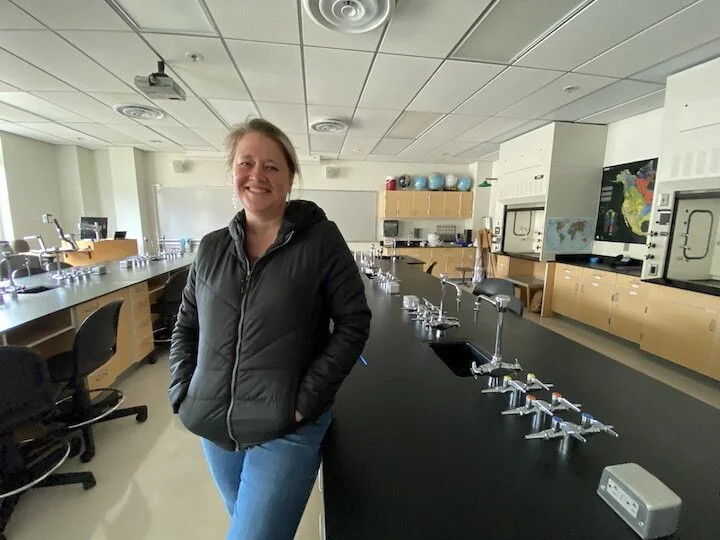Riverbend to go live on CGCC Campus April 19
Riverbend Executive Director Stacey Shaw is stoked about getting the local high school open for in-person learning on April 19. The charter school is located on the Columbia Gorge Community College Campus and has access to some great facilities such as this science lab. The school is located in Building 1 and is currently accepting students. It is a charter school with District 21. Students selected the name last year and also adopted the sturgeon as its mascot.
Faculty at Riverbend charter school are excited to be on the CGCC campus and adjacent to others in the community seeking to improve their lives through learning and training.
By Tom Peterson
Teacher Jocelyn Paris and buddy Olive
It’s been a long wait.
But finally, on Monday, April 19th, Riverbend Community School will be open to on-site learning for local students at the Columbia Gorge Community College campus.
The school, which is chartered through District 21, moved to the campus last summer but has been shut down for in-person learning due to the pandemic.
“It’s been kind of soul-crushing,” said Riverbend Teacher Jocelyn Paris. “We have access to these amazing facilities, and we don’t have students here.”
That all changes in a week.
Student Ashlyn Jones
Riverbend is an alternative to traditional high schools and provides hands-on project-based learning from four classrooms it leases from the college. Classes are smaller, and students have an intimate learning environment with a focus on problem-solving and inquiry-driven study.
Students who don’t have success in larger traditional schools may find it here. Riverbend is currently enrolling students.
Ashlyn Jones started attending the school this year. The 16-year-old said she was looking forward to seeing her teachers and classmates in person.
“I was never a good student,” she said, noting she had trouble focusing. But one-on-one work with teachers on more difficult subjects such as Geometry has helped. “I had a 3.0 GPA last quarter. That’s the highest I’ve had since fifth grade.”
Jones attributed that success to teachers making sure she understood a lesson before she began work on her own.
Teacher Josephine Colburn - Social Studies, History, After school programs for 2nd-5th graders
She also likes the project work. For example, she said they are building crash-test cars. And she is getting deep into journal writing with her classmates after being inspired by the Freedom Writers Diary. She said each of her classmates has chosen a topic to write about anonymously. She said it has helped bring out discussions about how to deal with anxiety and COVID-19 and going back to in-person classes.
Jones said the smaller class size has emboldened her to ask for help and in return, teachers are ensuring she understands the lessons.
Teacher Jocelyn Paris on Wednesday was teaching her students online about viruses and the immune system in their Biology class.
Teacher Kieran Connolly - Language Arts, Journalism, Music
The students picked a favorite song of their choice and changed the lyrics so that it included what they had learned about viruses and the immune system. They were also instructed to create a video and an album cover and bring their projects to completion.
Teacher Mary Brossman - Geology, Math, Visual Arts
In physics, the students were designing the crash cars, which had to include an egg in a harness they designed to keep it from breaking. In the process, they were also discovering crumple zones, airbags, roll cages and collapsable steering columns and applying the physics.
Paris said they were simulating 30 mph crashes with their models.
She also teaches forensic chemistry, health, physical fitness, sign language, wood shop, and culinary arts.
And she has plans for student-planted gardens to explore horticulture, soil science, pesticides and ecology.
Equity
Teacher Kyle J. Glenn - Media Arts
The faculty core at Riverbend has a strong sense of equity, with some serving on boards and volunteering to improve lives, Riverbend Executive Director Stacey Shaw said.
Riverbend Teacher Josephine Colburn also chairs the District 21 Equity Committee, for example.
Last year, the Oregon Department of Education interviewed Riverbend students to gather data on how L.G.B.T.Q.I.A.+ felt about their schools. Did they feel safe? Did they belong?
Teacher Sean O'Connor - Film, Media, digital story telling and Photography
Shaw said Riverbend was just one of four rural schools chosen for the study. And students were cited within it. Ultimately, the data helped secure $2 million in funding to improve conditions for students statewide that identify as L.G.B.T.Q.I.A.+.
Oregon Superintendent of State Instruction Colt Gill even picked Riverbend for a site visit.
“That’s a concrete example of equity-driven solutions,” Shaw said. “It was elevated to the state level to effect change.”
Mission
Ultimately, the school’s mission is to empower students to achieve their goals and make a positive impact on their community and their world through innovative project-based education, design thinking, and real-world application of new skills
“Learning should be a joy,” Shaw said. “You don’t want the last book that a person reads to be the one they had to read to graduate.”
The school is primarily on the third floor of CGCC’s Building 1, which also houses the cafeteria and library. It also overlooks the new Skill Center and Student Housing on the east side of the campus.
You can learn more about the school and enrollment by clicking here.









